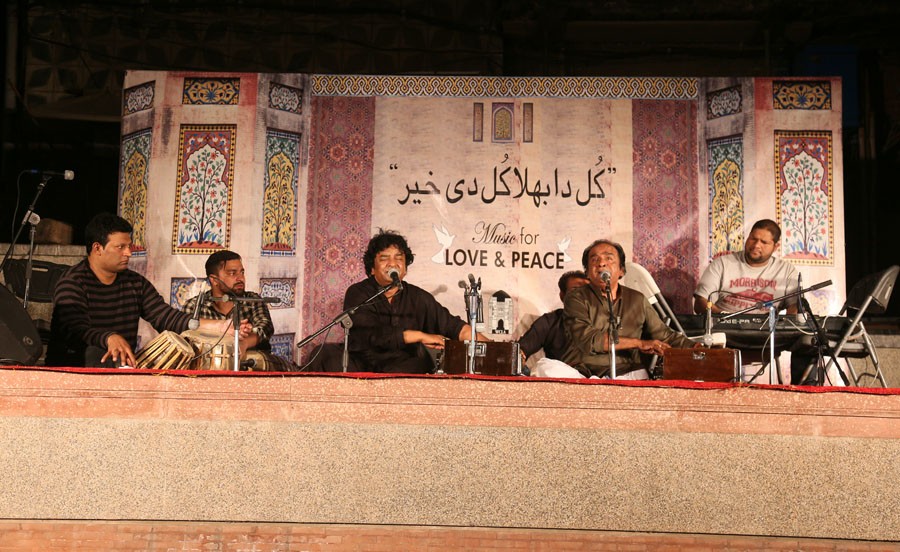
Sufi music nights are becoming a permanent feature at the Wazir Khan Chowk

There were only a few people sitting in the front rows initially, as workers from the Walled City of Lahore Authority (WCLA) prepared the stage. A couple of others were adjusting the lights, perhaps to make the couplets and verses inscribed on the wall of the Wazir Khan Masjid readable to the audience.
The lighting did enhance the ambiance of the place. It showed different shades of colours of carvings on the outer wall in contrast to the plain walls of less imposing and dimly-lit houses.
The courtyard was half full by the time someone on stage made the announcement, welcoming the crew from Iran. Everything seemed perfectly arranged, apart from the occasional noise of traffic, vendors, and people dining at food carts set up around the dried-up Dina Nath Well near the mosque. Some children who had accompanied their parents to the event were playing in the empty area behind the chairs before the programme formally started.
It featured two performances -- one, by an Iranian band called ShabDiz, and the other by Pakistan’s very own Niazi Brothers (as they are fondly called by music enthusiasts). The band began their performance with a folk song welcoming spring season. They also sang a part of the love legend of Laila-Majnu and a few couplets from the poetry of Omar Khayyam. Their music moved the audience although the latter did not quite seem to understand the language they were singing in.
ShabDiz is based in the Iranain coastal town of Bushehr, and comprises Ali Raza Alamdar Bushehri as lead vocalist, Mohsin Haidria on flute, Ismail Tangseeri on damam (a traditional Iranian tabla), Mustafa Gulistanon Zarb and Mehdi Sharifian on ooud. They had come here from Islamabad where they performed at the Pakistan National Council of Arts (PNCA) the night before. At the end of the first session a melodious ‘jugal bandi’ (duet) performed by the Iranian percussion player and a Pakistani tabla player was particularly enthralling, for it elicited a prolonged clap from the audience. Some even danced to the melody.
Javed Niazi and Babar Niazi began with a popular naat, followed by a rendition of Bulleh Shah’s poetry. The melodious voice of Niazi Brothers conveyed Shah’s anguish, set to the stringed and percussion instruments, so effectively that the performance almost made it sound surreal, leaving the audience in awe.
"Saada chirryian da chamba," (ours is a flock of sparrows) -- a popular folk song, originally sung by Tufail Niazi, father of the singing duo -- won the Niazi Brothers huge applause from the audience. Their rendition of both folk and Sufi poetry sounded so effortless that it reminded one of their father’s mastery over the different forms of singing. It also reaffirmed their position as true inheritors of their father’s rich musical legacy. They ended their performance with kafis by Shah Hussain and Amir Khusro.
This wasn’t a one-off event. The WCLA has been organising weekly musical nights every Saturday at the same venue for the past almost five months now, as part of its programme to promote night tourism in the Walled City. Talking to TNS, Asif Zaheer, Director Marketing & Tourism, WCLA, said that the reason for organising these events was "to restore the Walled City’s legitimate place as the centre of cultural activities in Lahore."
Pointing towards the small-sized rooms built on the one side of the courtyard, he explained, "When this mosque was built by Shah Jahan, the hujras were built to host travellers and this courtyard used to be a place for community gatherings and holding lively sessions of story-telling to entertain the visitors. This practice continued on for many centuries. I don’t know when it ended. Our aim is to revive that tradition."
Zaheer said that the authority had already organised three qawwali nights at the venue; the first was performed by Sher Mian Dad. "We also invited Faraz Qawwal, Afzal Qawwal, and Badar Khan. Besides, we’ve held story-telling sessions -- one was dedicated to the noted Urdu short story writer Saadat Hasan Manto, and the other was dedicated to Waris Shah’s Heer where we also had a singing session."
‘Kul da bhalakul de kher’ (may all prosper, may all have peace) is the theme of these music nights, he added, and hoped that holding such events in the courtyard of the mosque might help to "promote a message of peace and harmony."
Residents of the Walled City and those working in its various bazars as traders and shopkeepers find it very entertaining. Mian Usman, a cloth merchant from Rang Mahal, who claims to have attended all the events arranged at the venue by the WCLA, is happy about the initiative. "It provides us an opportunity to unwind for a while, and forget the worries of the everyday life."